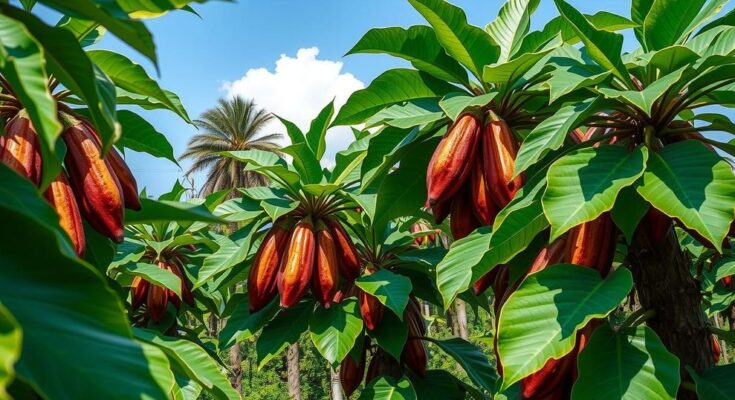Nigeria is positioning itself to increase its cocoa production amid skyrocketing prices, aiming to rival top producers like Ivory Coast and Ghana. Investors are expressing renewed interest, and the government has set a production target of 500,000 tonnes by 2025, although environmental concerns and small-scale farmer challenges persist.
The increasing global prices of cocoa are prompting Nigeria to establish a more significant position in the cocoa industry. Amidst challenges faced by major producers, such as Ivory Coast and Ghana due to climate change and disease, Nigeria is capitalizing on the surge. With prices reaching a record $12,000 per tonne in December, interest in Nigerian cocoa production has revived, attracting investors who had previously overlooked the sector.
The Cocoa Research Institute of Nigeria’s Executive Director, Patrick Adebola, stated that local farmers are benefiting from favorable market conditions. Over a dozen companies are considering investments or expansions in cocoa production. Additionally, the British government’s development finance arm has invested $40.5 million in Johnvents, a Nigerian agribusiness company, underscoring the growing appeal of the sector.
Currently, Nigeria ranks as the seventh largest cocoa producer, generating over 280,000 tonnes in 2023, based on data from the UN’s Food and Agriculture Organization. The Nigerian government has established a production goal of 500,000 tonnes for the 2024-2025 season, targeting a move to fourth place globally, trailing Ivory Coast, Ghana, and Indonesia. However, Adebola expressed skepticism regarding the feasibility of reaching this target within the envisioned timeframe.
Despite doubts about immediate success, there is optimism about rehabilitating old plantations and establishing new ones. This optimism is vital since Nigerian farmers encounter more volatility in the cocoa market due to the lack of price regulations compared to their counterparts in Ivory Coast and Ghana. Cocoa prices have since adjusted to over $8,000 per tonne after reaching their record high, with past prices averaging between $2,000 and $3,000.
According to Comrade Adeola Adegoke, President of the Cocoa Farmers Association of Nigeria, the current price surge has incentivized individuals at all production levels to enter the cocoa business. Nigeria’s cocoa industry, while promising, remains overshadowed by the production capabilities of neighboring Ivory Coast and Ghana—the latter producing 650,000 tonnes in 2023. Both countries experienced poor harvests that year, contributing to heightened global prices, whereas Nigeria’s cocoa remains relatively shielded from severe climate impacts.
Nonetheless, expanding cocoa production poses environmental concerns, particularly with the rise of “full-sun” monocrop plantations that emphasize cocoa cultivation without incorporating companion plants. A study published in Agroforestry Systems cautioned against this practice, suggesting that diversifying crops alongside shade trees could yield better ecological benefits and sustain the environments.
Challenges also persist for small-scale farmers, who dominate cocoa production in Nigeria. Farmer Peter Okunde from Ogun state reported a lack of financial resources and land for expansion. He highlighted land accessibility as a critical need for farmers. Conversely, John Alamu, Managing Director of Johnvents, emphasized that the challenge is not merely land availability, as Nigeria has 1.4 million hectares dedicated to cocoa, surpassing Ghana’s 1.1 million hectares. He advocates for a comprehensive approach that includes provision of seedlings, agronomic training, and sustainable agricultural practices to revitalize Nigeria’s cocoa sector.
In summary, Nigeria is striving to enhance its cocoa production amidst favorable global market conditions and in light of challenges faced by leading producers. The burgeoning interest from investors and the government’s ambitious production goals reflect a potential transformation in Nigeria’s agricultural landscape. However, the sector’s growth encounters environmental concerns and the need for support for small-scale farmers, which must be addressed to ensure a sustainable and successful cocoa industry.
Original Source: business.inquirer.net




